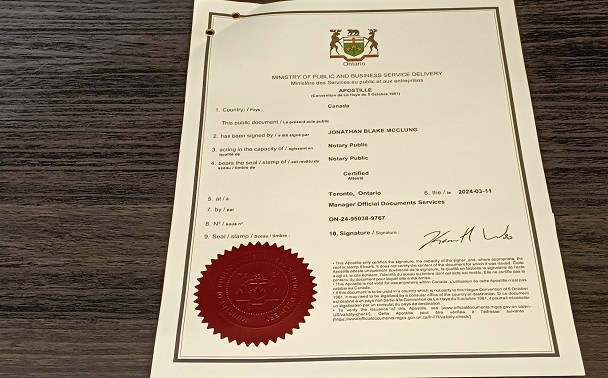Recognizing the Apostille Refine: A Comprehensive Guide to International File Verification
Browsing the elaborate landscape of worldwide record authentication can be discouraging without a clear understanding of the apostille procedure. This guide diligently describes the needed actions, from recognizing which documents call for certification to submitting them for verification by the Competent Authority. Grasping the relevance of an apostille and identifying potential pitfalls, such as insufficient entries and language obstacles, can significantly simplify the verification journey. What specifically specifies an apostille, and why is it so critical for documents destined for Hague Convention countries? These inquiries create the structure of our expedition into this vital legal treatment.
What Is an Apostille?
An apostille is an official accreditation that verifies the credibility of a file for usage in another country. This certification, issued by a designated authority in the nation where the file stemmed, makes certain that the document is recognized as valid and reputable in the global field. The procedure of getting an apostille involves numerous steps, consisting of the verification of the file's signatures, seals, and stamps by proper governmental bodies.
The apostille works as a worldwide acknowledged kind of authentication, made possible by the Hague Convention of 1961. This treaty, officially recognized as the Hague Convention Eliminating the Demand of Legalisation for Foreign Public Records, standardizes the process of record accreditation amongst participant nations. The apostille itself is a standardized certificate that includes details information, such as the issuing authority, the native land, and the date of issuance.
It is necessary to note that not all documents are eligible for an apostille. Commonly, public files like copyright, marital relationship licenses, court orders, and academic diplomas receive this qualification. Personal files, such as agreements and arrangements, might call for notarization and extra actions to qualify.
Value of Apostille
Comprehending what an apostille is sets the stage for valuing its value in international ventures. houston tx apostille. An apostille, essentially a form of accreditation released by an assigned authority, verifies the credibility of a paper for usage in foreign nations that are notaries to the Hague Apostille Convention. This standardized process removes the need for more legalisation by embassies or consulates, consequently enhancing worldwide transactions
It ensures the credibility and acceptance of necessary files-- such as copyright, marriage licenses, and academic diplomas-- across borders. For companies, it promotes the smooth conduct of worldwide profession, mergings, and acquisitions by providing a trusted method of paper confirmation.
Moreover, an apostille improves legal protection and conformity. Federal governments and institutions can confidently depend on the authenticity of files birthing an apostille, minimizing the danger of scams and misrepresentation.
Documents That Need Apostille
When participating in global purchases or legal matters, specific files commonly necessitate the authentication given by an apostille. This ensures their acknowledgment and approval in countries that are signatories to the Hague Apostille Convention. Commonly, personal papers such as birth certifications, marriage certifications, and death certificates call for an apostille, specifically when they are made use of for processes like immigration, marriage abroad, or global probate matters.
Educational files are an additional classification frequently calling for apostilles. Diplomas, records, and academic records commonly need this authentication for objectives such as seeking further education and learning, employment, or expert licensing in an international nation (houston tx apostille). This action assures that the documents are recognized as reputable and legitimate
Legal records, including powers of attorney, testimonies, and court orders, additionally generally require apostilles. Service documents such as certifications of incorporation, bylaws, and business agreements may call for an apostille to promote global trade, develop international branches, or engage in cross-border lawful proceedings.
Actions to Get an Apostille

Acquiring an apostille involves a multi-step procedure that makes sure the credibility and acceptance of your files in international nations. The initial action is recognizing which records require an apostille. houston tx apostille. Typical files include birth certifications, marital relationship licenses, scholastic transcripts, and corporate documents
As soon as recognized, the paper needs to be licensed by the proper providing authority. This might entail notarization by a notary public or verification by a neighborhood or state authorities, depending on the kind of paper. After accreditation, the document needs to be submitted to the designated Competent Authority in the paper's native land. In the United States, for example, this is typically the Assistant of State's office for each and every state.
The entry process normally requires a finished application, the original record, and a charge. Some territories may supply the option of expedited handling for an additional charge. Upon successful verification, the Competent Authority will certainly affix the apostille certificate to the record, thus validating its authenticity.
Typical Obstacles and Solutions
Browsing the apostille process can provide several usual challenges that, redirected here if not effectively dealt with, might postpone or make complex file verification. One constant issue is the submission of inaccurate or insufficient papers. Each country has particular demands for the sorts of documents that can be apostilled, and any type of variance from these can cause denial. Guaranteeing that all papers are exact and full prior to entry is essential.
Another common challenge is understanding the varied handling times. Handling times can vary significantly in between nations and also in between different regions within the same country. It is important to account for these variants when intending the apostille procedure to prevent unforeseen delays.
Additionally, language obstacles can posture considerable challenges. Files in a foreign language often call for qualified translations, and any type of inaccuracies in translation can lead to more difficulties. Engaging a professional translation solution can resource minimize this danger.

Conclusion
Understanding the apostille process significantly improves the efficiency of worldwide document authentication. By understanding the necessity of recognizing and certifying required documents, and browsing the entry to the Competent Authority, the redirected here process ends up being more workable.